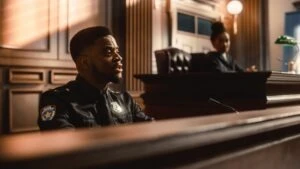
Need to know if an arresting officer has to be in court for a DUI in California? In a DUI trial in California, it is common for the arresting officer to testify in court, but they aren’t always required to appear. Understand the circumstances surrounding the officer’s presence with the help of a Los Angeles DUI lawyer near you.
After a DUI charge, it is common to search for answers regarding your case so that you have a solid defense strategy. Our law firm has collected frequently asked questions surrounding the topic of an officer’s court appearance for a DUI case so that you can feel prepared. Discover what’s required in California so that you can navigate your DUI case with ease.
Is an Arresting Officer Required to Appear in Court for a DUI Case?
The arresting officer’s in-court testimony and presence are critical in establishing the factual basis for the DUI charge. Their presence allows for the thorough examination and cross-examination of the evidence by both the prosecution and your first, second, or third Los Angeles DUI defense lawyer. An arresting officer would have to come to court due to:
Testimony and Evidence
As the primary witness in a DUI case, their testimony provides a foundation in the prosecution’s case by establishing the facts of the incident; including the initial stop, the observations that led to the suspicion of impairment, and the results of any field sobriety tests or chemical tests.
Cross-Examination
Their presence in court allows us to question them directly about their actions and the evidence they collected. Our Los Angeles DUI defense attorney will likely want to cross-examine the arresting officer to challenge the officer’s observations, the administration of field sobriety tests, the chain of custody for any chemical tests, and the overall circumstances of the arrest.
Credibility Assessment
A firsthand assessment of the officer’s credibility can be an important factor in the court’s decision-making process. The judge or jury will evaluate the credibility and reliability of the arresting officer’s testimony. Having the officer present allows the court to assess their demeanor, expertise, and attention to detail.
Rebuttal Testimony
The officer’s presence allows the prosecution to respond to any contradictory evidence or arguments presented by our legal team. If we present evidence or witnesses that challenge the officer’s account, the prosecutor may need to call the arresting officer back to the stand to provide rebuttal testimony.
For a free legal consultation, call (310) 896-2723
What Happens if the Arresting Officer Doesn’t Show Up to Court?
If the arresting officer fails to appear in court for your California DUI trial, it can have a significant impact on the prosecution’s case. Without the officer’s testimony, the prosecution may struggle to present crucial evidence against you. However, it does not automatically mean that your case will be dismissed. The judge will consider various factors before making a decision.
Can the Prosecution Use the Arresting Officer’s Report if They Don’t Testify?
Since the arresting officer is not always required to be in court for a California DUI case, the prosecution may attempt to use the arresting officer’s report as evidence. However, without the officer’s testimony, the report may be considered hearsay and could be challenged by our defense attorneys. Hearsay evidence is generally not admissible unless it falls under certain exceptions.
Are There Exceptions Where the Officer May Not Need to Appear in Court?
Yes, there are exceptions where the arresting officer may not need to appear in a California court for a DUI case. For example, if the officer is on active duty and is unable to attend the trial due to work-related reasons, the prosecution may be allowed to present the officer’s report as evidence. Additionally, if the officer has passed away or is otherwise unavailable, the prosecution may seek to introduce the officer’s report.
Complete a Free Case Evaluation form now
How Can I Challenge the Officer’s Absence From My DUI Hearing?
If the arresting officer fails to appear in court, your defense attorney can challenge their absence. Your attorney may argue that your constitutional right to confront your accuser is being violated. They may also question the reliability and accuracy of the officer’s report without the opportunity to cross-examine the officer. Challenging the officer’s absence can be a crucial part of your defense strategy.
What Evidence Can the Prosecution Present if the Officer Doesn’t Testify?
If the arresting officer doesn’t testify, the prosecution may still present other evidence to support their case. This can include the results of chemical tests, such as breathalyzer or blood tests, any statements you made at the time of your arrest, as well as other witnesses, such as the officer who conducted the chemical tests or any eyewitnesses to the incident.
Will the Judge Dismiss My Case if the Arresting Officer Doesn’t Appear?
The absence of the arresting officer in court for a DUI case can weaken the prosecution’s case, but it does not automatically result in a dismissal.
Whether or not the judge will dismiss your case if the arresting officer doesn’t appear depends on the specific circumstances of your case. However, it does not automatically result in a dismissal. The judge will consider factors such as the importance of the officer’s testimony and the reasons for their absence before making a decision.
What Should I Do if the Arresting Officer Fails to Show Up to My California DUI Trial?
If the arresting officer doesn’t show up to your California DUI trial, consult with an experienced Los Angeles DUI defense attorney at The Simmrin Law Group. Our attorneys will assess the situation and advise you of the best course of action to take.
Call or text (310) 896-2723 or complete a Free Case Evaluation form
